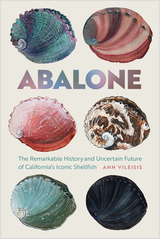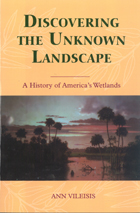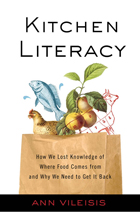
From rocky coves at Mendocino and Monterey to San Diego’s reefs, abalone have held a cherished place in California culture for millennia. Prized for iridescent shells and delectable meat, these unique shellfish inspired indigenous artisans, bohemian writers, California cuisine, and the popular sport of skin diving, but also became a highly coveted commercial commodity. Mistakenly regarded as an inexhaustible seafood, abalone ultimately became vulnerable to overfishing and early impacts of climate change.
As the first and only comprehensive history of these once abundant but now tragically imperiled shellfish, Abalone guides the reader through eras of discovery, exploitation, scientific inquiry, fierce disputes between sport and commercial divers, near-extinction, and determined recovery efforts. Combining rich cultural and culinary history with hard-minded marine science, grassroots activism, and gritty politics, Ann Vileisis chronicles the plight of California’s abalone species and the growing biological awareness that has become crucial to conserve these rare animals into the future.
Abalone reveals the challenges of reckoning with past misunderstandings, emerging science, and political intransigence, while underscoring the vulnerability of wild animals to human appetites and environmental change. An important contribution to the emerging field of marine environmental history, this is a must-read for scientists, conservationists, environmental historians, and all who remember abalone fondly.

The rapidly disappearing wetlands that once spread so abundantly across the American continent serve an essential and irreplaceable ecological function. Yet for centuries, Americans have viewed them with disdain. Beginning with the first European settlers, we have thought of them as sinkholes of disease and death, as landscapes that were worse than useless unless they could be drained, filled, paved or otherwise "improved." As neither dry land, which can be owned and controlled by individuals, nor bodies of water, which are considered a public resource, wetlands have in recent years been at the center of controversy over issues of environmental protection and property rights.
The confusion and contention that surround wetland issues today are the products of a long and convoluted history. In Discovering the Unknown Landscape, Anne Vileisis presents a fascinating look at that history, exploring how Americans have thought about and used wetlands from Colonial times through the present day. She discusses the many factors that influence patterns of land use -- ideology, economics, law, perception, art -- and examines the complicated interactions among those factors that have resulted in our contemporary landscape. As well as chronicling the march of destruction, she considers our seemingly contradictory tradition of appreciating wetlands: artistic and literary representations, conservation during the Progressive Era, and recent legislation aimed at slowing or stopping losses.
Discovering the Unknown Landscape is an intriguing synthesis of social and environmental history, and a valuable examination of how cultural attitudes shape the physical world that surrounds us. It provides important context to current debates, and clearly illustrates the stark contrast between centuries of beliefs and policies and recent attempts to turn those longstanding beliefs and policies around. Vileisis's clear and engaging prose provides a new and compelling understanding of modern-day environmental conflicts.

Ann Vileisis’s answer is a sensory-rich journey through the history of making dinner. Kitchen Literacy takes us from an eighteenth-century garden to today’s sleek supermarket aisles, and eventually to farmer’s markets that are now enjoying a resurgence. Vileisis chronicles profound changes in how American cooks have considered their foods over two centuries and delivers a powerful statement: what we don’t know could hurt us.
As the distance between farm and table grew, we went from knowing particular places and specific stories behind our foods’ origins to instead relying on advertisers’ claims. The woman who raised, plucked, and cooked her own chicken knew its entire life history while today most of us have no idea whether hormones were fed to our poultry. Industrialized eating is undeniably convenient, but it has also created health and environmental problems, including food-borne pathogens, toxic pesticides, and pollution from factory farms.
Though the hidden costs of modern meals can be high, Vileisis shows that greater understanding can lead consumers to healthier and more sustainable choices. Revealing how knowledge of our food has been lost and how it might now be regained, Kitchen Literacy promises to make us think differently about what we eat.

Ann Vileisis’s answer is a sensory-rich journey through the history of making dinner. Kitchen Literacy takes us from an eighteenth-century garden to today’s sleek supermarket aisles, and eventually to farmer’s markets that are now enjoying a resurgence. Vileisis chronicles profound changes in how American cooks have considered their foods over two centuries and delivers a powerful statement: what we don’t know could hurt us.
As the distance between farm and table grew, we went from knowing particular places and specific stories behind our foods’ origins to instead relying on advertisers’ claims. The woman who raised, plucked, and cooked her own chicken knew its entire life history while today most of us have no idea whether hormones were fed to our poultry. Industrialized eating is undeniably convenient, but it has also created health and environmental problems, including food-borne pathogens, toxic pesticides, and pollution from factory farms.
Though the hidden costs of modern meals can be high, Vileisis shows that greater understanding can lead consumers to healthier and more sustainable choices. Revealing how knowledge of our food has been lost and how it might now be regained, Kitchen Literacy promises to make us think differently about what we eat.
READERS
Browse our collection.
PUBLISHERS
See BiblioVault's publisher services.
STUDENT SERVICES
Files for college accessibility offices.
UChicago Accessibility Resources
home | accessibility | search | about | contact us
BiblioVault ® 2001 - 2024
The University of Chicago Press









